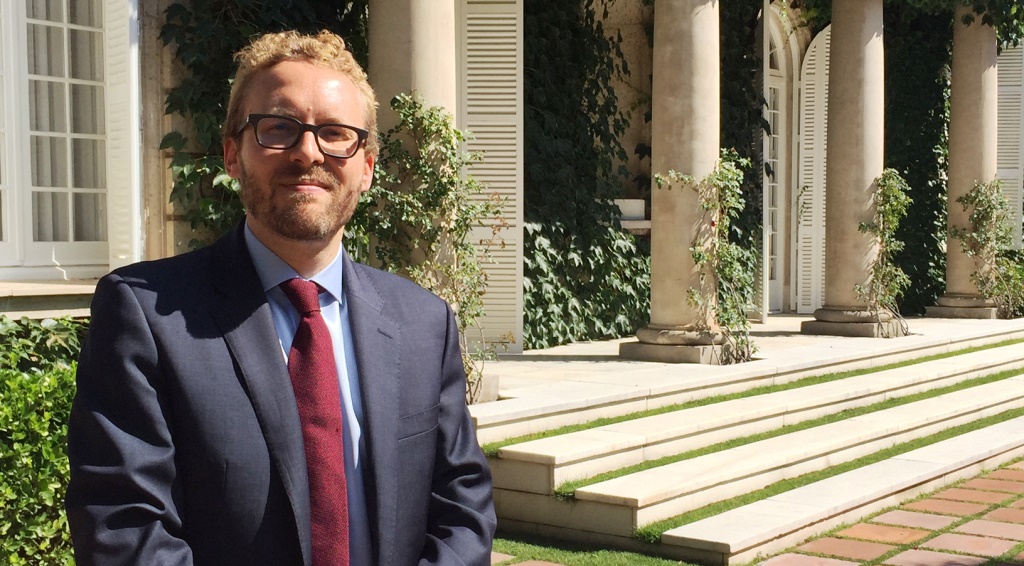This interview belongs to the blog series featuring interviews with current and future MBA students, MBA staff and faculty, offering readers a behind-the-scenes look at the IESE MBA Program. And now, introducing Pascal Michels, Associate Director of MBA Career Services.
IESE: Could you tell us a little bit about the finance MBA recruiting landscape these days?
Pascal: Sure. The first thing one needs to realize about financial services is that the industry recruits for a huge range of roles and products and absorbs a great variety of different profiles every year. This however is mostly true at the undergraduate level and it is important to understand the specificities of recruitment at MBA level. MBA recruitment is very resource intensive for companies and therefore focusses on areas where more experienced profiles add genuine value compared to that brought to the table by bright undergraduates joining straight from the world’s leading universities.
On the sell-side the two main MBA specific opportunities at the moment are in Investment Banking (Corporate Finance, M&A) and Private Banking (relationship management). This is not to say that other opportunities do not exist (e.g. Sales & Trading, Rotational Programs, In-house consulting) but these tend to be more bank-specific and with lower volumes. Opportunities on the buy-side (Asset Management, Private Equity, Venture Capital) are scarcer for MBAs, largely because hiring volumes are very low and positions tend to get filled by professionals switching from the sell-side. A good example of this would be a third year analyst getting hired out of M&A by a Private Equity firm. That being said, there are a number of players out there with MBA-specific, if highly selective, recruiting programs.
I: What should finance-minded candidates keep in mind when looking at full-time MBA programmes?
P: In terms of career aspirations in financial services it is important to distinguish the sell-side from the buy-side. To simplify matters, let’s look at investment banking (sell-side) and private equity (buy-side). Both industries are notoriously difficult to enter, but for very different reasons. investment banking recruitment of MBAs relies on a number of target schools which vary relatively little from bank to bank. There are currently 3 European schools that the top investment banks hire from in London and IESE is one of them. Private Equity, on the other hand, where MBA appetite is considerably lower, places more importance on the professional experience of candidates. In general a few years of M&A or, to a slightly lesser extent, time with a top strategy consulting firm will be required. This can be a difficult message to deliver to students at a top school who do not bring this experience to the table. The overall importance of networking in the PE space may in some isolated cases be a mitigating factor but these exceptions are extremely rare.
I: What is IESE’s positioning in that landscape?
P: Out of the top 3 full-time programs in Europe IESE’s has a very interesting positioning. Our full-time MBA is strongly anchored in the case-method approach and the focus on generalist management education. We are not a finance school, nor do we aspire to be. And yet, we are recognized by the world’s most prestigious banks as a talent pool for their MBA programs and do in fact provide our finance-minded students the service of a finance school in terms of career opportunities. In practical terms this means that anyone aiming at a role in investment banking in London should consider IESE. Bank of America Merrill Lynch, Citi, Morgan Stanley, Credit Suisse, Nomura, Deutsche Bank Goldman Sachs and Barclays hired 13 IB interns this summer, many having received multiple offers. While these numbers are relatively small, it is important to bear in mind that the number of students focused on investment banking, as measured by those students applying to 5 banks or more, did not exceed 40. In an industry as competitive as investment banking 33% of applicants securing a role is actually a quite impressive number. Our students also had a good run in Private Banking with 8 going joining Credit Suisse and JPM Morgan for the summer. And this is before taking into account the opportunities arising with smaller or more regional institutions (e.g. Santander IBD) later in the season.
I: How about the buy-side?
P: As I mentioned the buy-side game is played slightly differently with previous experience and networking taking somewhat of a precedence over the school of origin. Both this year’s summer and full-time seasons went very well but it is fair to say that those candidates who succeeded in securing buy-side roles are also the ones with the afore-mentioned backgrounds. The importance of the excellent Private Equity and Venture Capital clubs as well as candidates’ and professors’ networks deserve to be pointed out here. Of course there are exceptions! Two of our first year students will intern this year with Coller Capital and this has come through a fully-fledged formal on-campus process.
I: Let’s discuss something slightly different. You are an IESE MBA graduate yourself. Why have you decided to come back to work here?
P: That’s a funny question begging for a candid answer. I have to confess that I ended up in my current role somewhat by accident. When I started the MBA in 2008, Lehman Brothers went bust a few days after arriving on campus. These were crazy times and it felt eerie to be business student while the world economy was on the brink of collapse. Ironically this context meant that as someone with a finance background it was easier for me to stay in finance than to explore other opportunities. I was lucky enough to secure a summer internship and then a full-time offer on Citi’s FMA (Financial Management Associate) program in London. After three rotations of six months each I took a VP role in Citi Private Bank’s global CFO team. Overall, I must say that in my three years with Citi I have worked with the smartest and most driven people I have ever come across. This was an amazing learning experience and I will see myself as a “Citibanker” still for years to come before this wears off. But when it comes down to my actual finance skills, I now see that my heart was not into it. The learning was exceptional and I would repeat the experience without hesitation, but when I got approached by IESE for my current role I realized how much I enjoyed being on campus as a Citi representative, screening applications, interviewing candidates and mentoring new hires. So, in a way, all I did was switch sides.
I: So, how does it feel to now work here?
P: To be honest: it is absolutely amazing! Leaving an industry as demanding but also very rewarding as finance was always going to be a leap into the unknown. I doubt I would even have envisaged my current role had I not been an IESE MBA myself. I have a deep respect for IESE as an institution and look back at my time as a student here as perhaps the best of my entire life. Believe it or not, I get a bit of that student feeling back every day when I come to campus. I get paid to work in one of the most beautiful campuses on earth, dedicating my time to speaking to some of the most brilliant students in business education, get constant exposure to an intellectually stimulating environment, academia, and travel the world’s financial centers building relationships with fascinating people in extremely complex financial institutions. I admit: I sometimes I still have to pinch myself to believe it’s true.
I: Could you share with us an employment story you are particularly proud of?
P: I would like to start by pointing out a fundamental truth about this job: we care a lot about our students. There is nothing that hurts more than a dissatisfied graduate and there are a few, unfortunately, every year. On the flipside, few things beat the feeling of joy and pride when receiving thanks for your work from happy students. Luckily, there are quite a few more of the latter than of the former.
One of our recent graduates (class of 2015) comes to mind. This is someone who a friend and colleague referred to me before I even knew I was going to work for IESE, asking me to prepare him for their admissions interview. So I coached this person and he got admitted, which in itself was satisfying. Little did either of us know that our paths would cross again on campus, with me in a career counselling function. As finance was not his area of focus we did not relate all too much to each other until one day in the spring he came to me, asking how to get a position in a bank. As almost all banking recruitment is done by February, this was quite a challenge. In the end that student got a summer role in a boutique bank and after a lot of work together following the summer he will now join one of the main players in the sector. When you go through this together, and we did, counselling turns into friendship.









